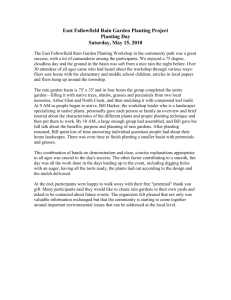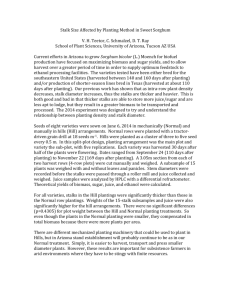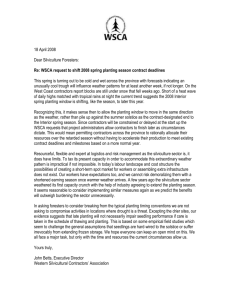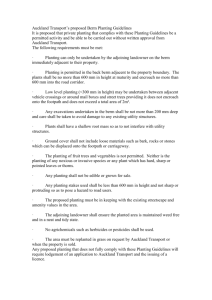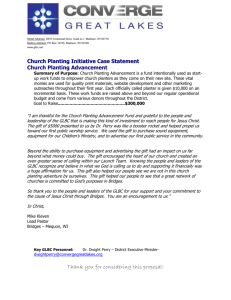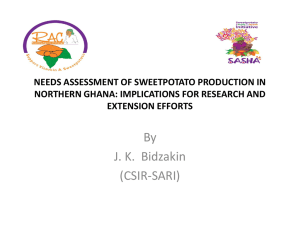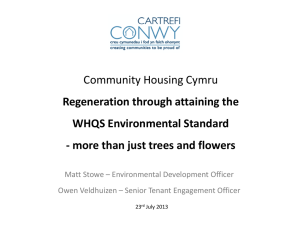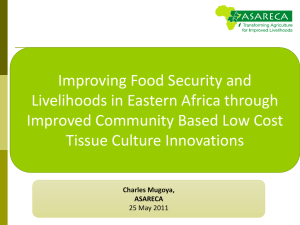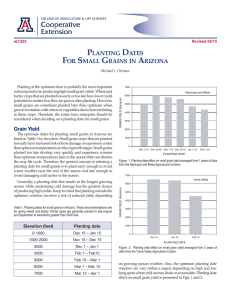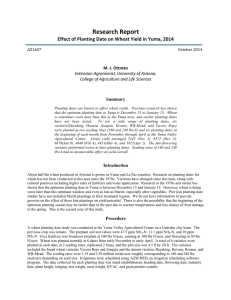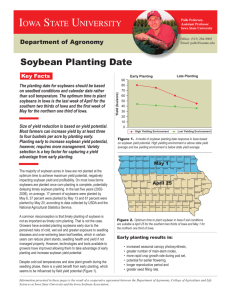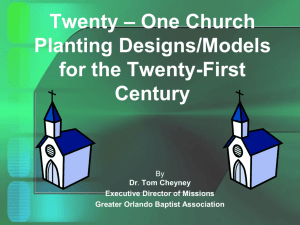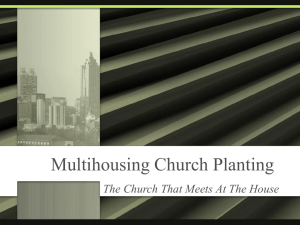Seeking the City that is to Come: Urban Planting and God`s Promise
advertisement
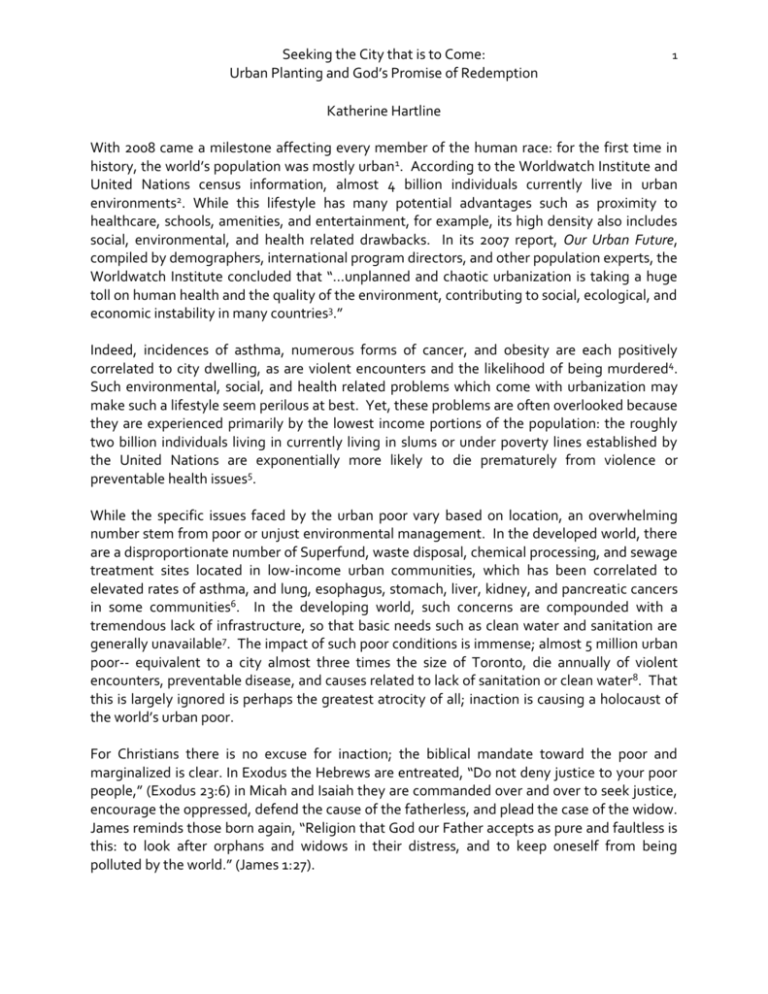
Seeking the City that is to Come: Urban Planting and God’s Promise of Redemption 1 Katherine Hartline With 2008 came a milestone affecting every member of the human race: for the first time in history, the world’s population was mostly urban1. According to the Worldwatch Institute and United Nations census information, almost 4 billion individuals currently live in urban environments2. While this lifestyle has many potential advantages such as proximity to healthcare, schools, amenities, and entertainment, for example, its high density also includes social, environmental, and health related drawbacks. In its 2007 report, Our Urban Future, compiled by demographers, international program directors, and other population experts, the Worldwatch Institute concluded that “…unplanned and chaotic urbanization is taking a huge toll on human health and the quality of the environment, contributing to social, ecological, and economic instability in many countries3.” Indeed, incidences of asthma, numerous forms of cancer, and obesity are each positively correlated to city dwelling, as are violent encounters and the likelihood of being murdered4. Such environmental, social, and health related problems which come with urbanization may make such a lifestyle seem perilous at best. Yet, these problems are often overlooked because they are experienced primarily by the lowest income portions of the population: the roughly two billion individuals living in currently living in slums or under poverty lines established by the United Nations are exponentially more likely to die prematurely from violence or preventable health issues5. While the specific issues faced by the urban poor vary based on location, an overwhelming number stem from poor or unjust environmental management. In the developed world, there are a disproportionate number of Superfund, waste disposal, chemical processing, and sewage treatment sites located in low-income urban communities, which has been correlated to elevated rates of asthma, and lung, esophagus, stomach, liver, kidney, and pancreatic cancers in some communities6. In the developing world, such concerns are compounded with a tremendous lack of infrastructure, so that basic needs such as clean water and sanitation are generally unavailable7. The impact of such poor conditions is immense; almost 5 million urban poor-- equivalent to a city almost three times the size of Toronto, die annually of violent encounters, preventable disease, and causes related to lack of sanitation or clean water8. That this is largely ignored is perhaps the greatest atrocity of all; inaction is causing a holocaust of the world’s urban poor. For Christians there is no excuse for inaction; the biblical mandate toward the poor and marginalized is clear. In Exodus the Hebrews are entreated, “Do not deny justice to your poor people,” (Exodus 23:6) in Micah and Isaiah they are commanded over and over to seek justice, encourage the oppressed, defend the cause of the fatherless, and plead the case of the widow. James reminds those born again, “Religion that God our Father accepts as pure and faultless is this: to look after orphans and widows in their distress, and to keep oneself from being polluted by the world.” (James 1:27). Seeking the City that is to Come: Urban Planting and God’s Promise of Redemption 2 Understanding the immense problems of the urban poor can be overwhelming-- paralyzing, even-- yet encouragement, promise, and inspiration can be found throughout scripture. In Colossians we are reminded that we are “strengthened with all power, according to His glorious might, so that [we] may have great endurance and patience,” (Colossians 1:11) and Christ Himself told his followers, “if you have faith as small as a mustard seed, nothing will be impossible for you.” (Matthew 17:21-22) Even the first unfurling of solutions can be found, if one reads closely. In Micah 4 it is prophesied, “They will beat their swords into ploughshares, and their spears into pruning hooks…Every man will sit under his own fig tree, and no one will make them afraid.” (3-4). In Romans, Paul speaks even more explicitly: “For the creation was subjected to frustration, not by its own choice, but by the will of the one who subjected it, in hope that that the creation itself will be liberated from its bondage to decay, and brought into the glorious freedom of the children of God.” (8:20-21) Clearly, part of the solution to the problems of the urban poor will stem from planting. The concept of urban planting is effective in mitigating a variety of physical and social hazards borne primarily by the poorest and most marginalized groups, bringing God’s promise of justice and renewal to the city; the implementation of simple planting projects will make cities cleaner, safer, and more full of opportunity for those most affected by their negative impacts. Planting projects take three primary forms: the implementation of bioremediation, the development of farms and gardens, and the renewal of green spaces. Bioremediation is the practice of using microorganisms, fungi, and green plants to return contaminated soil and water to it original condition, and is a proven cost-effective and efficient manner of decontaminating water for consumption and land for redevelopment, decreasing the hazard of living in close proximity to chemical, waste, or food processing plants9. Developing urban farm and gardening centres provides a therapeutic outlet for community members, the potential for an exponentially healthier lifestyle, and independence from corporate food structures. The creation and restoration of green spaces provides safe community gathering places, cleans polluted air, and creates natural percolation and purification systems for soil and water. Furthermore, the implementation of such projects provides both skilled and unskilled job opportunities for community members, improving economic prospects and increasing independence from band-aid programs such as welfare10. While urban centres are hubs of breathtaking artistic innovation and dynamos of economy, they are also home abject poverty and breeding grounds for alienation and violence, sickness and disease, and governmental and corporate dependence. Urban planting projects offer solutions to these and other problems, allowing even the individual to be the change they wish to see in their community. Seeking the City that is to Come: Urban Planting and God’s Promise of Redemption 1 3 Knickerbocker, B. "World First: In 2008, Most People Live in Cities." The Christian Science Monitor 12 January 2007. 10 Mar 2009 <http://www.csmonitor.com/2007/0112/p25s02-wogi.html>. 2 Ibid. 3 WorldWatch Institute. 2007. State of the World 2007: Our Urban Future. 1. Washington, DC: W.W. Norton and Co. 4 Ibid. 5 Pellow, D.N., A. Weinberg and A. Schnailberg. 2001. “The Environmental Justice Movement: Equitable Allocation of the Costs and Benefits of Environmental Management Outcomes.” Social Justice Research (14): 423-439. 6 WorldWatch Institute. 2007 State of the World 2007: Our Urban Future. 1. Washington, DC: W.W. Norton and Co. 7 Ibid. 8 Pellow, D.N., A. Weinberg and A. Schnailberg. 2001. “The Environmental Justice Movement: Equitable Allocation of the Costs and Benefits of Environmental Management Outcomes.” Social Justice Research (14): 423-439. 9 Zaferatos, N.C. 2006. “Environmental Justice in Indian Country: Dumpsite Remediation on the Swinomish Indian Reservation.” Environmental Management (38): 896-909. 10 Sarokin, D.J. and J. Schulkin. 1994. “Environmental Justice: Co-Evolution of Environmental Concerns and Social Justice.” The Environmentalist (14): 121-129.
